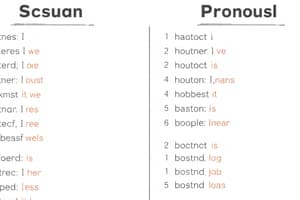Podcast
Questions and Answers
Which of the following pronouns is irregularly inflected?
Which of the following pronouns is irregularly inflected?
- we
- I
- she (correct)
- they
What is the plural form of the verb 'has'?
What is the plural form of the verb 'has'?
- having
- have (correct)
- has
- had
Which verb tense has a distinction between singular and plural in the third person only?
Which verb tense has a distinction between singular and plural in the third person only?
- Past Perfect
- Simple Past (correct)
- Present Perfect
- Present Continuous
What is the plural form of the pronoun 'itself'?
What is the plural form of the pronoun 'itself'?
Which of the following is NOT a plural pronoun?
Which of the following is NOT a plural pronoun?
Which verb tense uses 'were' for the plural form?
Which verb tense uses 'were' for the plural form?
Which of the following is a singular pronoun?
Which of the following is a singular pronoun?
Which of the following is a plural verb?
Which of the following is a plural verb?
What is the singular form of the pronoun 'ourselves'?
What is the singular form of the pronoun 'ourselves'?
Which verb tense uses 'has' for the third person singular?
Which verb tense uses 'has' for the third person singular?
Flashcards are hidden until you start studying
Study Notes
Pronouns and Verb Forms
- Irregularly inflected pronouns can include "who" or "whom," which change forms based on case (subjective vs. objective).
- The plural form of the verb 'has' is 'have.'
- The simple present tense has a distinction between singular and plural in the third person (he, she, it).
- The plural form of the pronoun 'itself' is 'themselves.'
- Examples of plural pronouns include 'we,' 'they,' and 'you,' while 'he,' 'she,' and 'it' are not plural pronouns.
- The subjunctive mood uses 'were' for all subjects when expressing hypothetical situations.
- Singular pronouns include 'I,' 'he,' 'she,' or 'it.'
- A plural verb typically refers to one that agrees with plural subjects, such as 'run,' 'jump,' or 'are.'
- The singular form of the pronoun 'ourselves' is 'myself' or 'yourself,' depending on the context.
- The present perfect tense uses 'has' for the third person singular (he, she, it).
Studying That Suits You
Use AI to generate personalized quizzes and flashcards to suit your learning preferences.




